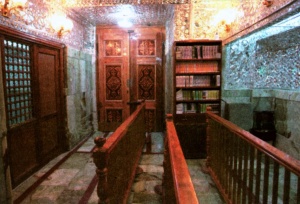Hasan bin Yusuf Hilli
Jamāl ad-Dīn al-Ḥasan bin Yūsuf bin ʿAli bin al-Muṭahhar al-Ḥillī (December 1250 – December 1325), commonly known as Allāma Ḥelli, was a Twelver Shia theologian and mujtahid.
| Ḥasan bin Yusuf Ḥilli | |
|---|---|
 | |
| Full Name | Hasan bin Yusuf Hilli |
| Author's Code | AUTHORCODE00008AUTHORCODE |
Preface
Praise be to Allah Who honored mankind by sending to them His messengers as lights of guidance; and blessings be upon the Prophet, the guide of people, who exposed the way of salvation and purity to all people; and the most sincere blessings be upon the Prophets Household who were the Imams and leaders of the religion and had the most obvious role in protecting the luminous rulings of Islam. Those honorable figures trained people who enjoyed prepared souls by interpreting the pure religion of Islam to them through their revelatory knowledge. They also protected Islam from decaying by explaining and commentating the pure Prophetic Shariah, educating talented students and disseminating the Islamic teachings.
The true scholars have all the time been the samples of rationality, knowledge, piety, sincerity, enlightenment, guidance, dignity, endeavor, and self-sacrifice. In their books has been manifested a fraction of their scholarly endeavors. At the time being, the expansion of new methods of disseminating information has provided a proper ground for conveying the scholars knowledge to those who are thirsty for wisdom.
Taking into consideration the importance of the Muslim scholars works, Computer Research Center of Islamic Sciences has been determined to take steps toward commemoration of them by collecting and presenting their writings in the form of software programs to enable the researchers to take advantage of their knowledge.
The polymath prolific scholar Allamah Hilli )d. 726/1326( is one of great personalities in whom the Shia take pride. He has written various books in different branches of knowledge, which have been hailed, annotated or explained by the scholars interested in those branches. Allamah Hilli compiled his books for readers of different levels of education and knowledge. In jurisprudence, for instance, he wrote the books of Tabsirat al-Mutaallimin, Idah al-Ahkam and Irshad al-Adhhan for the elementary level. He compiled Qawaid al-Ahkam and Tahrir al-Ahkam for the intermediate level, and Mukhtalaf al-Shiah, Tadhkirat al-Fuqaha and Muntaha al-Matlab for the advanced level.
Tahdhib al-Usoul, Mabadi al-Wusoul and Nihayat al-Wusoul are the writings of Allamah Hilli in the field of principles of jurisprudence. His book in ilm al-kalam )theology( called Minhaj al-Karamah fi Marifat al-Imamah enraged the Salafi Sunni scholar Ibn Taymiyyah )d. 728/1327( to that extent that the latter wrote a rebuttal against it under the title of Minhaj al-Sunnah. Nahj al-Haqq wa Kashf al-Sidq is another compilation of the Allamah in this field to prove the divinely appointed leadership of Imam Ali, the Commander of the Faithful. His book in the field of logic is called al-Jawhar al-Nadid. Hilli has penned a book about Arabic grammar.
Computer Research Center of Islamic Sciences has already used writings of Allamah Hilli in its various software programs; however, since his writings in different fields of knowledge together with the annotations and commentaries written on them constitute a big collection, the CRCIS has decided to develop a separate software program comprising Allamahs all writings. It is hoped that this product will contribute to the dissemination of Islamic culture and will gain Allahs satisfaction.
Introduction to the Program
The program consists of four main parts: Display, Search, Interrelated books and the Quran.
Display
This part contains 99 books in 359 volumes. The user can customize the range of displayed books. The tables of contents of books are presented in both tree and selective indexes. Ten dictionaries are also provided for the researchers convenience. Printing and transferring the table of contents and texts to Notepad are among other capabilities offered in this part. Moreover, text tools including adding highlights, annotations, bookmarks and user indexes are prepared )accessible by right-clicking( for research affairs. In addition, searching in the texts of books, dictionaries or the Holy Quran research tools are possible in the same way.Û
Search
The user can make simple and advanced searches in this part using search operators and list making capability with wildcards )×, ?).
The books and their translations or explanations )if available in the program( have been mutually linked to each other.
Quran
Full text of the Quran along with its translation and search options has been included in a separate part so that it can be accessed from everywhere in the program.
Tools
This part includes Print, Transfer to Notepad, Dictionary and Help.
Options
The user can customize keyboard layout, fonts, personal researches path )adding highlights, annotations, user index entries and bookmarks( and interface language )English, Persian and Arabic( using this part.
Computer Research Center of Islamic Sciences is open to any constructive criticism and suggestion of yours that may help us with the promotion of the program.
Computer Research Center of Islamic Sciences )CRCIS(. All rights reserved.